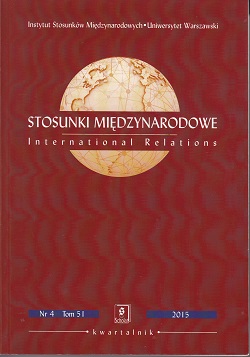Postrzeganie Indii i Chin w brazylijskiej nauce o stosunkach międzynarodowych w kontekście globalnych aspiracji Brazylii
Perception of India and China in Brazilian International Studies in the Context of Brazil's Global Aspirations
Author(s): Marcin Florian GawryckiSubject(s): Politics / Political Sciences, Politics, Political Sciences, International relations/trade
Published by: Wydawnictwo Naukowe Scholar Sp. z o.o.
Keywords: Brazil; India; emerging power; BRICS; IBSA
Summary/Abstract: For more than half a century, apart from developing the strategic alliance with the West (especially the United States) Brazil has striven to establish itself as a major power in the world on the basis of cooperation within the global South, even if this creates problems in defining its own international identity. Africa used to be perceived as the opportunity for Brazil to diversify its external relations, but after the Cold War ended the focus of interest shifted decisively to Asia. This evolution of the Brazilian foreign policy is reflected in the Brazilian international studies. The aim of this article is therefore to show the perception of Brazilian researchers on the opportunity to raise their country’s importance through deepening cooperation with Asia. In this paper the author will attempt to demonstrate that according to Brazilian scholars, their country’s cooperation with Asian countries – primarily India and China – could create an effective counterbalance to the West, finally allowing Brazil to fulfil its aspiration to a greater role in the world. Consequently, I would like to look into three key issues: the problem of Brazil’s international identity, Brazilian scholars’ perception of the distribution of international power (on the example of Samuel Pinheiro Guimarães Neto) and Brazil’s turn towards the global South, especially under President Luiz Inácio Lula da Silva. The broad category of ‘emerging powers’, defined and (re)interpreted in various ways, encompasses China, India and Brazil. There is no doubt, however, that the last of these states considerably lags behind the other two in terms of international position and role. A number of internal and external factors have led to this, but they will not be analysed in this paper. Brazil’s lesser potential – economic, demographic and military – certainly contributes to the fact that the country is not treated equally with China or India, but it is also the consequence of Brazil adopting a decisively neoliberal course in the 1980s, which effectively brought (or rather kept) the country in the sphere of influence of the West, especially the United States.
Journal: Stosunki Międzynarodowe
- Issue Year: 51/2015
- Issue No: 4
- Page Range: 115-132
- Page Count: 17
- Language: Polish

